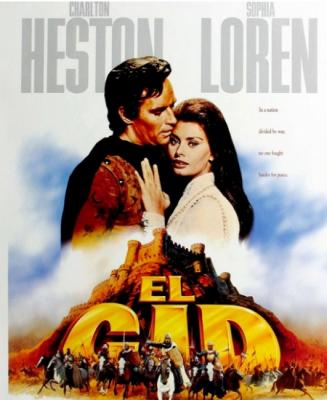El Cid

Rodrigo Díaz de Vivar (Vivar del Cid, Burgos, hacia 1043 – Valencia, 1099) fue un hidalgo y guerrero castellano.
El Cid Campeador (del árabe dialectal سيد sīdi, ’señor’, y del latín campae docto, ’diestro en el campo de batalla’, ’conocedor de la batalla’), llegó a dominar prácticamente todo el oriente de la Península Ibérica a finales del siglo XI, de forma autónoma respecto de la autoridad de rey alguno, aunque con el beneplácito del rey Alfonso VI, de quien Rodrigo siempre se consideró vasallo.
Se trata de una figura histórica y legendaria de la Reconquista española, cuya vida es la base del más importante cantar de gesta de la literatura española, el Cantar de mio Cid.
Su caballo se llamó Babieca y sus espadas descansan en museos españoles, Tizona y Colada. El Cid ganó su última batalla ya fallecido, le ataron a su caballo y el enemigo huyó al verle cabalgando de nuevo.
Según el autor musulmán andalusí Ibn Bassam (1109):
Este hombre, el azote de su tiempo, por su ansia de gloria, por la prudente tenacidad de su carácter, por su heroica valentía, fue uno de los milagros de Dios.
Trozos de algunas de películas dedicadas al héroe:
http://www.youtube.com/watch?v=v5e1L5ocXUw
Más información:
http://es.wikipedia.org/wiki/Cid_Campeador
--------------------------------------------------------------------------------------------------------------------------
Rodrigo (or Ruy) Díaz de Vivar (1043, Vivar, near Burgos – 1099, Valencia), known as El Cid Campeador, was a Castilian nobleman, a gifted military leader and diplomat who, after being exiled, conquered and governed the city of Valencia. Rodrigo Díaz was educated in the royal court of Castile and became the alférez, or chief general, of Alfonso VI, and his most valuable asset in the fight against the Moors.
The name "El Cid" comes from the Spanish article "El", and the dialectal Arab word سيد "sïdi" or sayyid, which means "Lord". So "El Cid" can be translated as "The Lord". The title "Campeador" is a vulgar Latin word roughly meaning "master of military arts". He is considered one of the national heroes of Spain.
His horse was called Babieca and his swords are in Spanish museums, Tizona and Colada. El Cid won his last battle die, his soldiers attached him on his horse and the enemies ran after see him again.
Text from Ibn Bassam, muslim writer (1109):
This man, the hammer of his time, by yearning for glory, by the prudent tenacity of his character, by his heroic bravery, he was one of the miracles of God.
A part of the film El Cid:
http://www.youtube.com/watch?v=v5e1L5ocXUw
More information:
http://en.wikipedia.org/wiki/El_Cid
0 comentarios